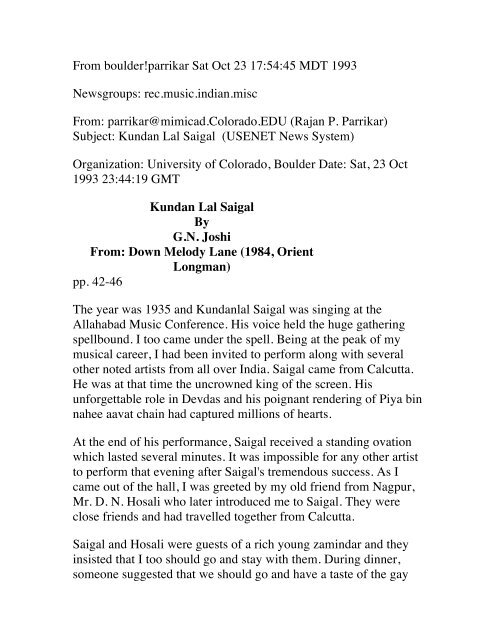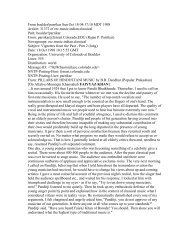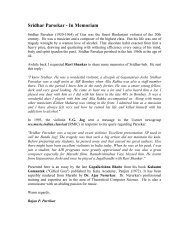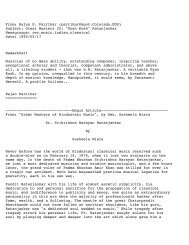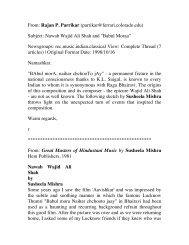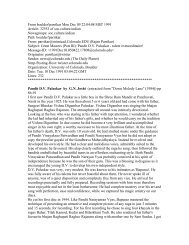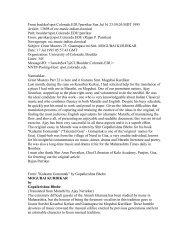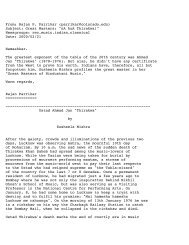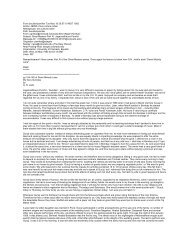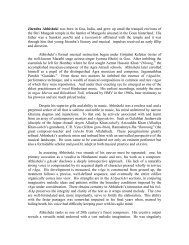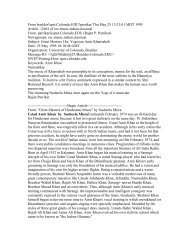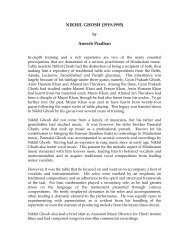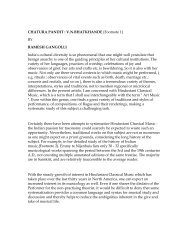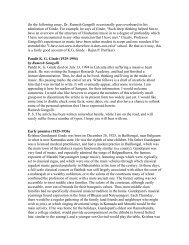K.L. Saigal - Rajan Parrikar Music Archive
K.L. Saigal - Rajan Parrikar Music Archive
K.L. Saigal - Rajan Parrikar Music Archive
You also want an ePaper? Increase the reach of your titles
YUMPU automatically turns print PDFs into web optimized ePapers that Google loves.
From boulder!parrikar Sat Oct 23 17:54:45 MDT 1993 Newsgroups: rec.music.indian.misc From: parrikar@mimicad.Colorado.EDU (<strong>Rajan</strong> P. <strong>Parrikar</strong>)Subject: Kundan Lal <strong>Saigal</strong> (USENET News System) Organization: University of Colorado, Boulder Date: Sat, 23 Oct1993 23:44:19 GMT Kundan Lal <strong>Saigal</strong>ByG.N. JoshiFrom: Down Melody Lane (1984, OrientLongman)pp. 42-46The year was 1935 and Kundanlal <strong>Saigal</strong> was singing at theAllahabad <strong>Music</strong> Conference. His voice held the huge gatheringspellbound. I too came under the spell. Being at the peak of mymusical career, I had been invited to perform along with severalother noted artists from all over India. <strong>Saigal</strong> came from Calcutta.He was at that time the uncrowned king of the screen. Hisunforgettable role in Devdas and his poignant rendering of Piya binnahee aavat chain had captured millions of hearts.At the end of his performance, <strong>Saigal</strong> received a standing ovationwhich lasted several minutes. It was impossible for any other artistto perform that evening after <strong>Saigal</strong>'s tremendous success. As Icame out of the hall, I was greeted by my old friend from Nagpur,Mr. D. N. Hosali who later introduced me to <strong>Saigal</strong>. They wereclose friends and had travelled together from Calcutta.<strong>Saigal</strong> and Hosali were guests of a rich young zamindar and theyinsisted that I too should go and stay with them. During dinner,someone suggested that we should go and have a taste of the gay
musical nightlife of the city. The young zamindar was, of course,familiar with the most reputed joints, and so off we all drove. Inthose days, in decent society, music was taboo - it was consideredimmoral to learn or listen to music - much more so for girls. I hadheard a lot about the 'mujra mehfil' (song and dance performancesat the client's request) of the dancing girls and my curiosity wasaroused; I was soon slowly following the other three up the stepsof the singing girls' house.At the entrance we were greeted by a middle aged lady with abroad smile and the traditional salutation 'Adabaraz'. We walkedinto an elegantly furnished chamber, brilliantly lit. The entire floorwas covered with soft, rich coloured woollen carpets andmatresses.Moments later two young girls, just out of their teens, entered frama side room. Having seen the film Devdas, they found <strong>Saigal</strong>'spresence in person both awe-inspiring and highly pleasing. <strong>Saigal</strong>'sfriendly approach and unassuming manner soon dispelled theirawe. An exuberant and intelligent conversation ensued. It was fullof wity and spontaneous repartee in which these girls are speciallytrained, and with which <strong>Saigal</strong> appeared to be quite familiar. Forme, this was a new and revealing experience, and I watched thescene with interest. One of the girls approached us with a tray ofpaanpattis and whcn my turn came, I was so confused and nervousthat the girl gave a mischievous smile as my trembling fingerslifted the paan. I muttered my thanks, 'Shukriya', and pocketed theoffering. I dared not eat it.Of the two young girls, one was an accomplished singer with arich, sonorous voice, and the other was an expert dancer. Thumri,the most captivating style in Hindustani music, has its home inU.P. The Banarasi or Purab form of presenting it has no parallel inlight classical music. The dancer used her feet, hands, fingers,neck, eyes and eyebrows most expressively to illustrate the song.
After another item - a Kathak dance - <strong>Saigal</strong> and the zamindar paidthe girls and we rose to go. It was about 2.30 a.m. when we gotback to the zamindar's kothee. It was situated on the river bank, notfar from the confluence of the Ganga and Jamuna. Cool breezesbrought fragrance from the garden below, while the full moonturned the river milky white. <strong>Saigal</strong> was in a happy mood andstarted humming. The zamindar produced a harmonium which Istarted playing. <strong>Saigal</strong> requested me to join him in singing. Takingthe cue from the notes he hummed, I began a thumri in MishraKhamaj - Mane Nahee Samiya. Instantly <strong>Saigal</strong> took up the refrainand then there followed a musical duet. <strong>Saigal</strong> then started BabulMora, his piece de resistance in Bhairavi. The first rays of the sunheralding the dawn brought us down to earth.I kept in touch with <strong>Saigal</strong>, and in the month of December, thesame year, we met again - this time in Calcutta where I had gonefor the Calcutta musical conference. My wife had accompaniedme. <strong>Saigal</strong> took us home for dinner one evening. We had theprivilege of meeting his old parents. Hailing from the beautifulvalley of Kashmir, they were tall and fair and had a veryimpressive presence.It was at the dinner table that night that I learnt more about <strong>Saigal</strong>.Before he made music and acting his vocation, <strong>Saigal</strong> had been atime-keeper in the Punjab railways. After that he had worked for awhile as a typewriter salesman. He used to sing only within hiscircle of friends. Singing was his hobby. The credit for discovering<strong>Saigal</strong> goes to a representative of the Hindustan RecordingCompany. He correctly estimated the sales potential of the youngman and bound him down to a life-long contract. This is why allhis non-film songs were invariably issued during his lifetime underthe Hindustan label, although in later years his records of filmsongs appeared under H.M.V. Iabel. (Hindustan was a sisterconcern to H.M.V.)
Years rolled by and <strong>Saigal</strong> continued to reach new heights of fameand popularity. Entering New Theatres in 1931, he became thenational matinee idol. Chandidas, Devdas, Street Singer andDushman were all huge box office successes. He soon migrated toBombay to win new laurels.I, in the meantime, had joined H.M.V. as recording executive. Wemet in 1943, in the recording studios. He embraced me and therewere tears of joy in our eyes. Suddenly he asked me question, 'Doyou drink or not?'I was puzzled and asked, 'Why?'He said, 'He who does not drink is not a gentleman.'To this I replied that in that case I was only half a gentleman.Thereupon I told him about an incident involving the late poetMirza Ghalib. An English soldier once asked him, 'Are you a trueMuslim?' Ghalib pondered for a few moments and then said, 'No, Iam only half a Muslim.' He explained that the Muslim religionforbids the eating of pork and the consumption of alcoholic drinks.'I do not eat pork, but I do drink liquor.'The point of the story was that while I refrained from strong drinkslike whisky and rum, I did enjoy an occasional glass of beer. <strong>Saigal</strong>gave a hearty laugh. After that, whenever we were together Ialways had a beer while he nursed his scotch. While working in theRanjit film company, he frequently came to our studio to record hissongs, always in the afternoon. On arrival he would come straightto my cabin and put his bottie of scotch in my table drawer. Heknew very well that it was safe with me!Normally, there would be about half a dozen rehearsals before thcactual recording. He would have half a peg between rehearsals. Hisvoice became mellower with each rehearsal, and then would come
a stage that was the ultimate in beauty. It was my job to catch himon disc at this stage, when every word, every note bore the stampof rare and rich artistry. All the songs he recorded for Tansen,Surdas and Shahjahan became immortal.One day we ended the session a little early. <strong>Saigal</strong> came to myroom and said, 'Bhaiyaa, I haven't heard you sing for a long time, Iam not in the mood to go away so soon. Also I have sufficientscotch left in my flask.'I used to compose tunes in those days. Pandit Indra, a top poet ofthe time, was a great friend of mine. Often he would drop in andwe would sit together - I with the harmonium and Panditji with padand pencil. Between the two of us we composed a number ofdevotional and love songs. That night I sang a few of them to<strong>Saigal</strong>.He was soon to play the role of Surdas in the forthcoming film.Some of the songs took his fancy. He spoke to Sardar ChandulalShah about them. Sardar Chandulal came to our Manager, with arequest to requisition my services. He made a very tempting offer.However my previous experience in films had not been at allfavourable and I had resolved never to enter films again. So after acouple of days I thanked them but declined the offer. <strong>Saigal</strong> cameto me furious and thundering, 'Why are you being so foolish?' Iexplained my position to him. To this day I havn't regretted mydecision nor did it affect my relations with <strong>Saigal</strong>.I have very vivid memories of the evenings, when we recordedMadhukar shyam hamare chor, Main nahee makhan khayo (fromSurdas), Diya jalao (from Tansen). Listening to these discs I recallthe scenes. <strong>Saigal</strong> in the centre, flanked by the accompanists, withmusic director Khemchand Prakash and myself standing in frontlistening with interest.
<strong>Saigal</strong> used to lose himself completely under the influence ofliquor but he never, even in that state, misbehaved or did anythingnot befitting a gentleman. He would be very restless if the alcoholdid not have a quick effect on him. One night, after a late recordingsession, we were driving home from the studio. As we nearedParel, he asked if I knew of any place nearby, where he could havesome more booze. He had been drinking the whole evening, so Itried to dissuade him and suggested that we proceed straight home.He said, 'Arre Bhai, what's the use of my drinking the whole day, ifI return home sober - all that drink will go waste.' I dropped him ata hotel at Dadar where, I learnt later, he stayed the whole nightwith a bottle of 'Black and White'.<strong>Saigal</strong>'s devotion to his work was far above any other artist's. Hehad a heart of gold and was a faithful friend. He never turned awaya needy fellow artist. On several occasions, I saw him dig into hispocket and give away all he had to some unfortunate person.At night, if I am alone, I sometimes listen to his songs Balam aavobaso mere man me, Karu kya aasa niras bhayee, So ja Rajkumariso ja and Piya bin nahee aavat chain. I cannot hear without a panghis immortal melody Dukha ke din aba bita nahee.


